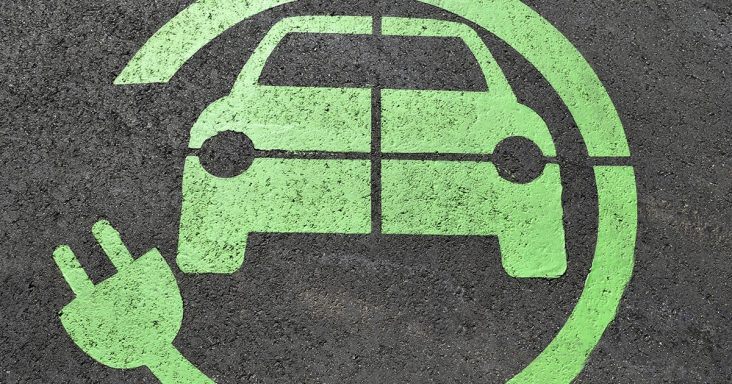State accelerates EV charging station program; solar farm completed
by October 13, 2022 2:19 pm 1,442 views

As another advanced energy project comes online, the state continues to invest in electric vehicle charging stations.
The Arkansas Department of Energy & Environment (E&E) recently announced it’s accelerating the final disbursement of money for Level 2 charging stations. The Level 2 Electric Vehicle Supply Equipment Program is open to government, private and nonprofit organizations in Arkansas.
According to E&E, the final disbursement includes $227,791, or enough to reimburse up to 45 chargers. The average rebate for a Level 2 charging station is $5,000.
“I couldn’t be any more excited about broadening EV infrastructure across our state,” said E&E Cabinet Secretary Becky Keogh. “Due to the overwhelming amount of interest, we made the decision to make the last round of funding available now for the public. I’m encouraging all entities that have installed charging stations after February of this year to apply for reimbursement. Rebates are awarded on a first-come, first-serve basis.”
The program provides rebates for Level 2 chargers installed in Arkansas between Feb. 1 and Dec. 1. It’s open to public and private applicants across the state but does not include chargers installed at private residences. Level 2 chargers can charge electric vehicles in eight hours or less using a 240-volt output. By comparison, Level 3 chargers, or DC-fast chargers, can charge an electric vehicle in about 20 or 30 minutes.
According to a news release, E&E will launch AR Charge in 2023 because of the success of the Level 2 Electric Vehicle Supply Equipment Program and is expected to build on the program’s success. Details about AR Charge will be announced in January.
Since the Level 2 Electric Vehicle Supply Equipment Program was launched in 2021, E&E has provided $629,316 in reimbursements for 137 charging stations at 56 locations in 14 counties. Program funding comes from the $14.6 million awarded to Arkansas through the Volkswagen settlement.
“Anyone in Arkansas who wants access to drive electric vehicles should have no worries about the accessibility of charging their vehicle, no matter where they live within the state,” Gov. Asa Hutchinson said. “This continued push for expanding the reach of electric vehicle infrastructure will make sure Arkansas is fully equipped for innovative technologies.”
According to the U.S. Department of Transportation’s Federal Highway Administration (FHWA), Arkansas will receive $11.52 million in fiscal 2023 for the National Electric Vehicle Infrastructure Program (NEVI) for electric vehicle infrastructure. The FHWA recently announced the money that will be made available this fiscal year to Arkansas from the $1.2 trillion Bipartisan Infrastructure Law. Fiscal 2023 started Oct. 1.
Previously, the FHWA approved Arkansas’ Electric Vehicle Infrastructure Deployment Plan, allowing the state to use the NEVI money for fiscal years 2022 and 2023. The plan shows how the state will grow its charging network of about 532 chargers, using money from the Bipartisan Infrastructure Law. The priority is to place high-powered chargers along 512 miles of designated electric vehicle corridors in Arkansas. According to the FHWA, about $19.5 million was made available for fiscal years 2022 and 2023 for the state to expand its charging network.
SOLAR ARRAY CONSTRUCTION
Little Rock-based solar energy company Delta Solar recently completed a 256-kilowatt solar array for agricultural equipment supplier AGUP Equipment, with stores in southeast Arkansas and Mississippi. The array, which was installed in Halley Junction in Chicot County, is expected to save AGUP Equipment more than $994,437 in energy costs over the next 30 years and will meet 83% of its electricity demand.
“AGUP Equipment, formerly known as Arkansas Ag, has been providing southeast Arkansas producers with quality John Deere equipment and service for decades,” said AJ Hood, partner for Delta Solar. “Their decision to include solar in their new facility shows a continuous commitment to not only southeast Arkansas but the environment as well.”
In Arkansas, AGUP Equipment has locations in Halley Junction, Dumas, Eudora and Portland.
“AGUP Equipment is committed to our communities, our employees and our customers,” said Kyle Fulcher, CEO of AGUP Equipment. “We also strive to be innovative, seeking new and creative solutions to exceed customer expectations. Incorporating Delta Solar’s customized solar energy system into our business operations strengthens our ability to continue to provide quality products and services at low costs.”
According to a news release, businesses like AGUP Equipment can use two tax provisions to reduce the cost of a solar energy system: a federal Investment Tax Credit equal to 30% of the total system cost and accelerated depreciation, allowing businesses to depreciate 85% of the system cost in the first year of operation.
